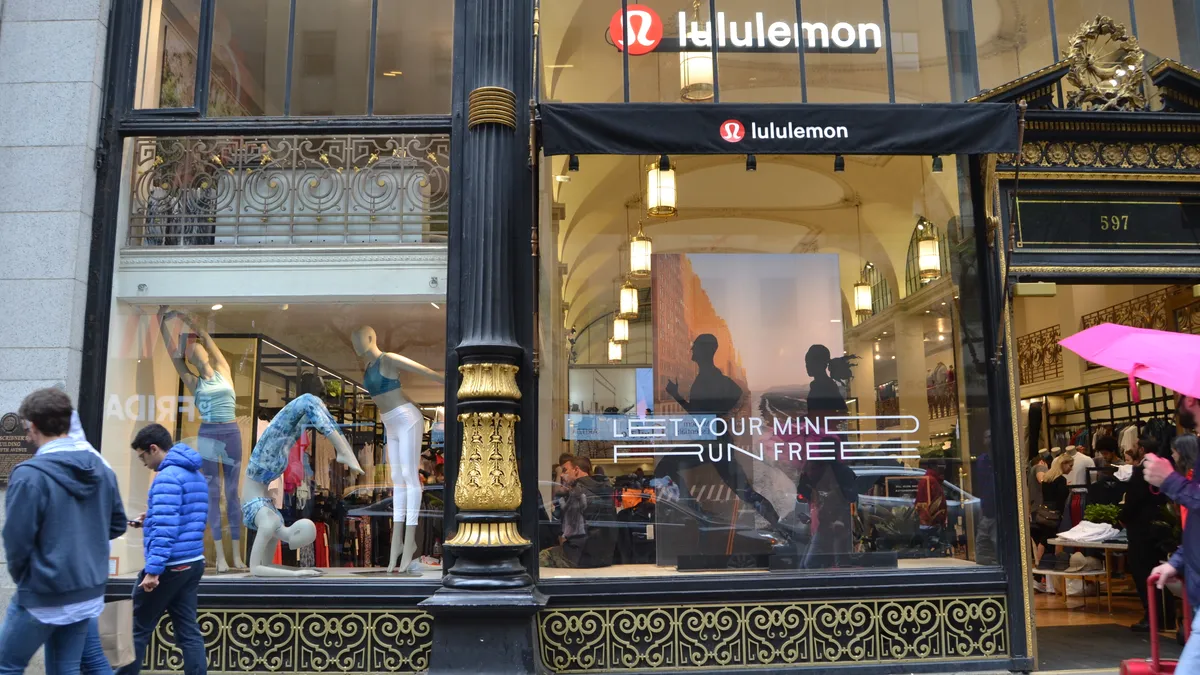Dive Brief:
-
For the holiday season, Lululemon will expand its 50 pop-ups to 70, adding some near existing stores, and has developed omnichannel and communications options, to promote social distancing requirements due to the pandemic, according to a conference call transcript from Motley Fool.
-
The announcement arrived Tuesday amid the report that second quarter net revenue rose 2% to $902.9 million, with e-commerce up 155% to $554.3 million. The athleisure retailer in a press release said it didn’t report store comps because of temporary store closures related to the pandemic.
-
Net income fell 30.6% to $86.8 million, income from operations fell 26% to $124.4 million, and gross profit rose 1% to $489.5 million. Gross margin fell 80 basis points to 54.2%, and operating margin fell 520 basis points to 13.8%.
Dive Insight:
While revenue was up in the second quarter, and Lululemon is among the few retailers in the black as the pandemic continues, margins and profits in some measures shrank year over year. CEO Calvin McDonald said in a statement that he remains "cautiously optimistic," about results for the back half of the year.
The reason for optimism is Lululemon's strength in a market all the more favorable to its merchandise, as more people opt for casual clothing while they continue to work from home.
The reason for caution is found in the retailer's store productivity, which McDonald said hasn't surpassed 75% and isn't likely to improve much in the next two quarters. Credit Suisse analyst Michael Binetti in emailed comments said the firm's team was "somewhat disheartened" that second quarter store revenues fell 51% year over year, more than the 49% first quarter decline, when more stores were closed.
In addition to the added pop-ups, the company is taking other measures to ease bottlenecks during the holidays, including switching from in-store pickup to curbside. The retailer is also using "virtual waitlists" so customers can be notified that they can go into the store, rather than waiting in line, an option used by almost 400,000 in 280 locations last month alone, according to McDonald.
But its e-commerce operations may also be throttled, and that may require solutions. While the retailer itself didn't note any capacity issues, Binetti said the company has told the Credit Suisse team that it originally planned investments with an eye to 40% growth in online sales, while Credit Suisse is forecasting closer to 60% growth.
"[O]ur hunch is that LULU may need to invest in some temporary, third party [e-commerce] fulfillment assets during 4Q to reach that level of demand," Binetti wrote, adding that "could explain" Lululemon's preparation for a 400 basis point decline in operating margins despite its guidance for revenue growth of between 7% and 10% in the second half of the year.
With its $500 million acquisition in June of at-home fitness company Mirror, Lululemon has yet another way to capitalize on the pandemic era's home confinement, and, indeed, the company is now forecasting that Mirror will generate more than $150 million in revenue in 2020, up from $100 million. The company is increasing its marketing "to take advantage of current trends toward spending from home and capitalize on the opportunity to drive business during the holiday season and into next year." That will dilute some of Mirror's profit-making, he warned.
But McDonald also said the company sees it as a long-term play. Mirror membership and equipment is available online and will be in just 10 to 15 Lululemon stores by the fourth quarter, reflecting plans to "definitely build it slowly and test and learn and be able to go a little bit more aggressive in '21."
Credit Suisse analysts dismissed near-term profit concerns around the marketing investment, noting that the real goal is ultimately "higher margin subscription revenues and the ability to directly showcase its apparel to high frequency consumers in the home."















